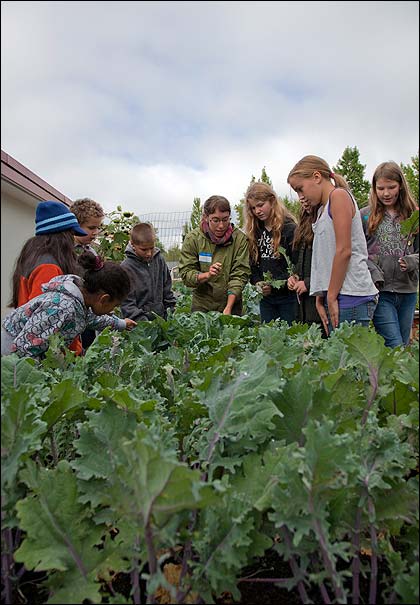
Food for Life
School gardens grow healthier kids
by Rachel Foster
“Raise your hand if you’ve ever been in a garden.” An impressive show of hands. “Raise your hand if you have a garden at home.” Not bad — this is Eugene, after all.
 |
| Photo by Rob Sydor • robsydor.com |
The questioner is Jenny Laxton, program coordinator for the School Garden Project (SGP) of Lane County. For this 4th grade class at Cesar Chavez Elementary, it’s their very first garden session, and Laxton is about to lay out some garden rules before we go outside: no running; don’t walk on the beds; ask before you taste something; and don’t poke people with the tools. Cesar Chavez is one of twelve schools working with SGP’s garden-based education program this year. Laxton and her assistants will meet with each participating class twice a month through fall and spring.
Everyone is quiet and attentive in the classroom, though the noise level picks up a bit as the students split up into groups. Then it’s out to the garden for a scavenger hunt, and 24 kids are in active mode. Most stay more or less on task. The assignments range from easy (find a honey bee, find something that smells good) to challenging (find an earthworm). Together they call for careful observation of flowers, leaves, fruit and soil in a garden filled with squash, sunflowers, tomatoes, carrots, strawberries and every kind of leafy vegetable. As a bonus, everyone gets 40 minutes of fresh air and exercise.
One in three adults in Lane County, Oregon is overweight or obese, and so are one in five children between the ages of two and 17. Those who are overweight in childhood set themselves up for obesity as adults. Learning ability and social skills can also suffer, leading to loss of earnings and a less fulfilling life. The Centers for Disease Control and Prevention have recognized that the leading causes of obesity are eating too many calories and not getting enough exercise. Many people, from Michelle Obama down, are recognizing that reconnecting kids with exercise and a healthier diet is vital to stalling the rise of obesity and attendant disorders such as diabetes. Obesity costs the country billions in healthcare and lost productivity.
A healthier diet essentially means one lower in sugar and saturated fat and higher in vegetables and fruit. SGP students get to taste something from their school garden at the end of every session. Programs like this are a great way to introduce students to vegetables and fruits they may not otherwise have access to. Studies at UC Davis show that students are more likely to try eating vegetables if they themselves grew them, and students are more likely to accept similar foods in school lunches and ask for them at home. School gardens help kids in other ways as well. They provide hands-on learning opportunities in many fields, including natural and social sciences, math, visual arts and nutrition. There is mounting evidence that kids who participate in school gardening score better on science achievements tests. And simply getting kids outside boosts environmental awareness.
Jared Pruch, the outgoing executive director of SGP, told me that this is one of only five sites in Oregon (42 nationally) to host a Food Corps member in the coming year. This is the pilot year for Food Corps, a new Americorps program focused specifically on helping schools grow vegetable gardens. The City of Eugene provided $10,000 this year to help put in new gardens and establish cafeteria composting systems at five additional schools.
Students in SGP’s education program receive a full year of twice-monthly, one hour gardening classes to plant, tend and harvest garden crops. Member schools also receive vegetable starts grown at the Community Transition Program greenhouse, free participation in a Garden Educator Workshop series, help with planting a school orchard and volunteers for work parties. At the end of the year, SGP coordinates a spring celebration at each participating school. Students eat a meal fresh from the garden, complete an art project, and pot up a plant to tend over the summer.
SGP grew out of a school garden seminar held at the University of Oregon Urban Farm in 2000 and was established as a non-profit in 2001. That makes SGP one of the country’s older school garden programs. If you’d like to support SGP, there are a number of ways to do so. You can donate money, sign up for an eScrip program or mention SGP when you shop at Sequential Biofuels. You can also volunteer, as a group or as an individual, to join special project work parties or help maintain school gardens throughout the summer. The need is greatest for people to help with education programs. For details, visit www.schoolgardenproject.org or contact Jenny Laxton at sitecoord.sgp@gmail.com.
Rachel Foster of Eugene is a writer and garden consultant. She can be reached at rfoster@efn.org